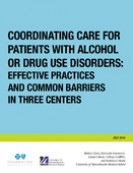

Coordinating Care for Patients with Alcohol or Drug Use Disorders: Effective Practices and Common Barriers in Three Centers
In recent years, integrating treatment for mental health and substance use disorders (SUD) with primary care has been the subject of extensive research testing a number of different integration models and specific interventions. While many of these approaches have shown promise in demonstrations or clinical trials, the true test of value is in real-world settings where there are competing demands on scarce resources, strict fidelity to intervention protocols is difficult, and patients have multiple urgent needs. This report, prepared by a team led by Robin Clark and Deborah Gurewich of the University of Massachusetts Medical School, describes the process of providing integrated care for patients with SUD at three sites in central Massachusetts: Edward M. Kennedy Community Health Center, Family Health Center of Worcester, and Community Healthlink. It identifies common practices that improve care coordination for individuals with SUD and concludes with overarching key findings from the study.
